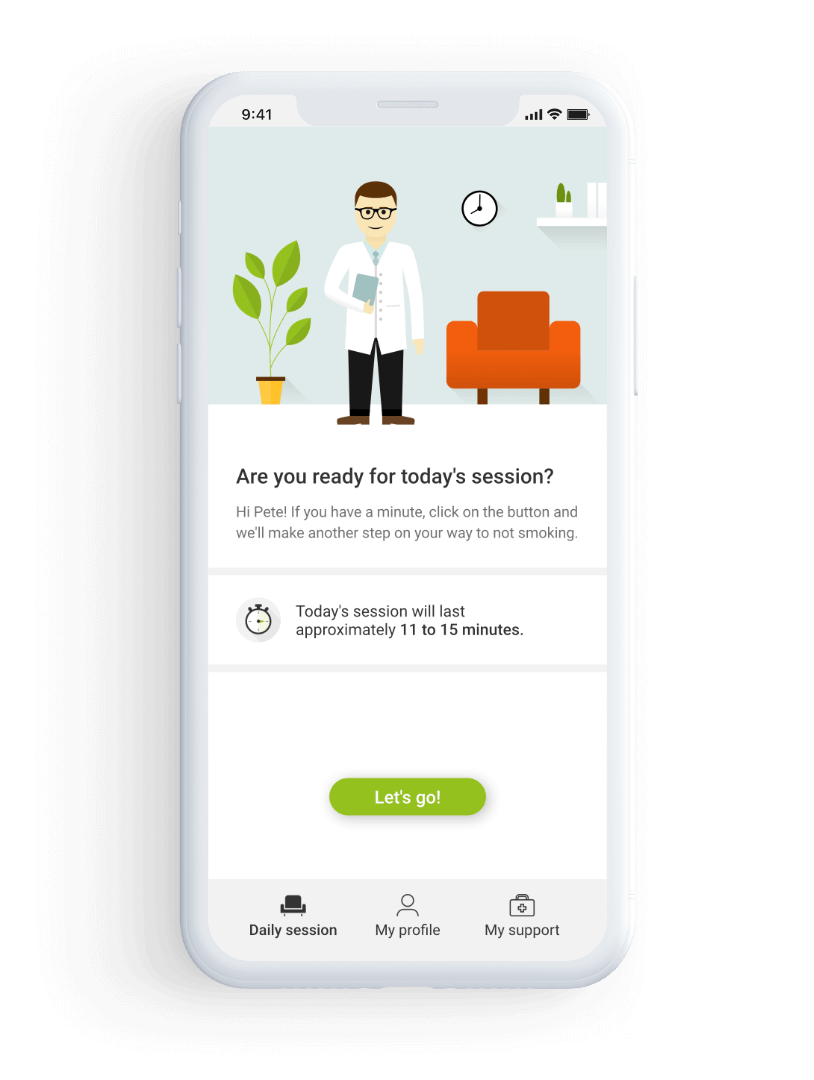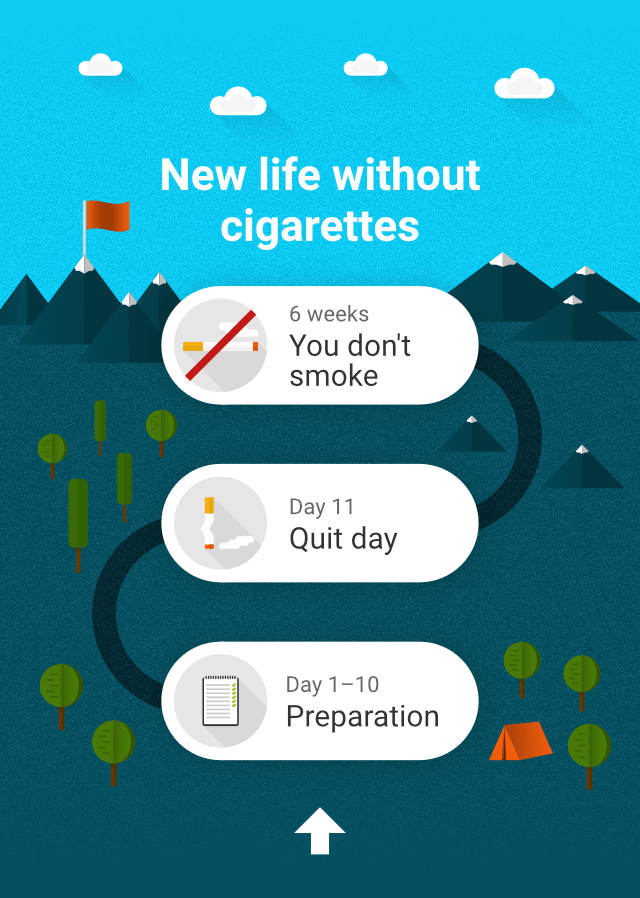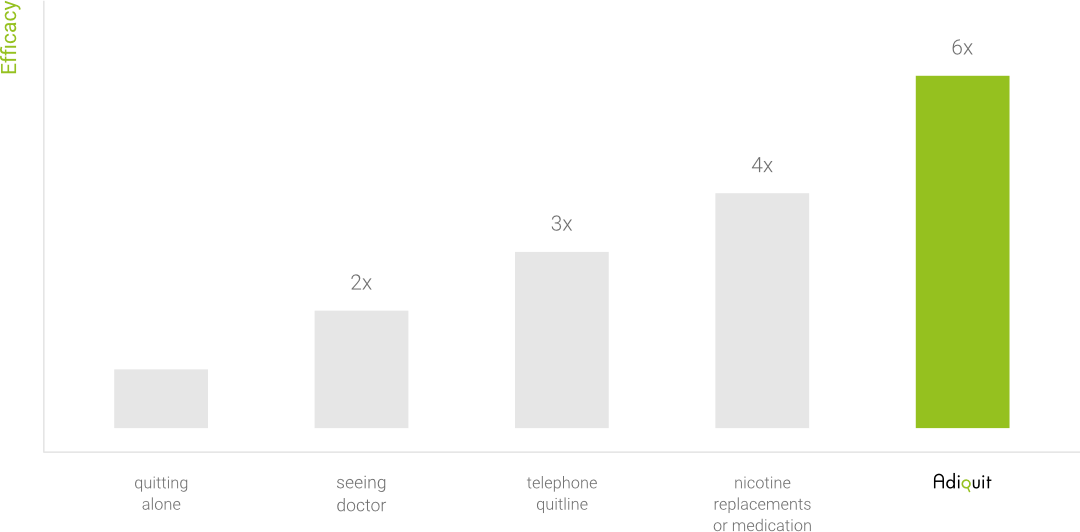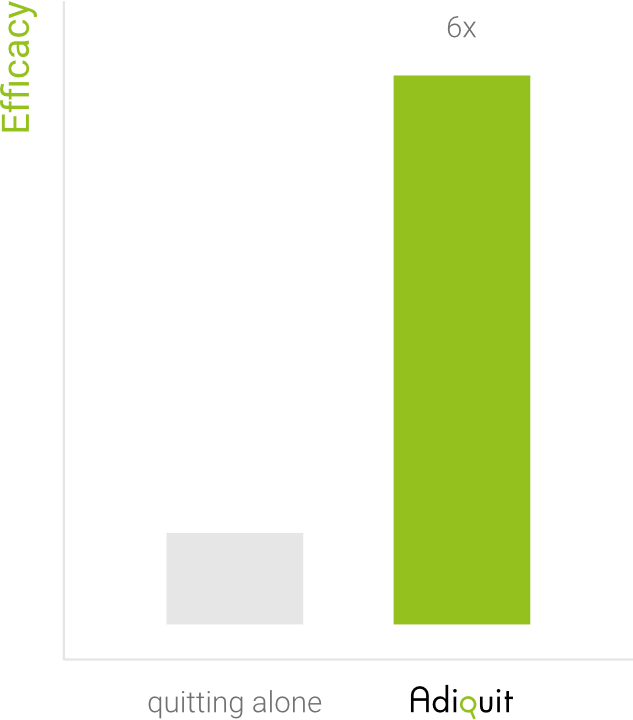A four-month long interactive therapy
for smokers
The only mobile phone quit-smoking app based on scientific knowledge and real clinical practice. A systematic support of a virtual therapist is available 24/7. It reacts to the user’s opinions and needs. It will guide them through the quitting process and help to overcome the withdrawal symptoms.

What does the app work like?
A four-month long interactive therapy under the control of a virtual addictologist
A 3 – 10 minutes long therapeutic dialogue every day
Quick help when feeling an urge to smoke
Adjusting the therapy according to the user’s opinions, results and needs
The app has been developed by prominent experts on addiction treatment from universities in Norway, the USA and the Czech Republic. It simulates a real withdrawal cure used in therapeutic practice.
Smoking is an addiction and quitting is harsh. The majority of failures is caused by the lack of information on how our psyche works, therefore, thorough professional preparation and support are crucial while quitting. According to RCT, the chance to succeed with Adiquit is approximately six times greater compared to no professional aid.
How are we going to proceed?
Don’t worry, we will start easy. You can smoke as usual for the first ten days. You will be preparing for life without cigarettes.
Then, the D day comes. That’s when you put out your last cigarette.
I’ll be helping in the following weeks – together, we’ll make you a non-smoker
Making a former
smoker rich
The first days in the app are free. You can get the whole four-month long therapy for the price of a few packs of cigarettes. You can save for an amazing holiday after a year without smoking.
Why does it work?
The tobacco addiction is one of the strongest. It shows physical symptoms caused by the effect of highly addictive nicotine in our brain and also mental symptoms like craving for a smoke in a specific situation or company (e.g. while having a cup of coffee or with smoking friends). With the help of Adiquit you will set up a tailored working strategy for such cases.
The effectiveness of quitting smoking without a professional aid is very low. Up to 95% of such attempts fail. If a smoker decides to start quitting with the help of a therapist, nicotine replacement or medication, the way becomes easier. Unlike the other available aids, the Adiquit app is at hand 24/7. You can call on it anytime you need. Therefore, it is as much as 30% more successful method.
Studies among smokers quitting with the Adiquit app proved long-term success rate of quitting to be almost 30%. That is as much as six times greater chance to succeed compared to quitting on your own.
Adiquit utilizes interventions in accordance with recommendations of WHO (WHO, 2003), guidelines of The European Network for Smoking and Tobacco Prevention (ENSP, 2017) and the Clinical Practice Guideline for Treating Tobacco Use and Dependence of the American panel (Fiore et al., 2008).
Clinical studies Adiquit has been based on
- Kulhánek A., Gabrhelík R., Novák D. & Brendryen H. (2019). eHealth intervention for smoking cessation for Czech tobacco smokers: Pilot study of user acceptance. Adiktologie, 18(2), 81–85.
- Kulhánek A, Lukavska K, Gabrhelík R, Novák D, Burda V, Prokop J, Holter MTS, Brendryen H, Comparing Reminders Sent via SMS Text Messaging and Email for Improving Adherence to an Electronic Health Program: Randomized Controlled Trial, JMIR Mhealth Uhealth 2022; 10(3).
- Brendryen, H., Drozd, F., & Kraft, P. (2008). A digital smoking cessation program delivered through internet and cell phone without nicotine replacement (happy ending): randomized controlled trial. J Med Internet Res, 10(5), e51. doi:10.2196/jmir.1005
- Brendryen, H., & Kraft, P. (2008). Happy ending: a randomized controlled trial of a digital multi-media smoking cessation intervention. Addiction, 103(3), 478-484; discussion 485-476. doi:10.1111/j.1360-0443.2007.02119.x
- Cahill, K., Stevens, S., Perera, R., & Lancaster, T. (2013). Pharmacological interventions for smoking cessation: an overview and network meta-analysis. Cochrane Database Syst Rev(5), Cd009329. doi:10.1002/14651858.CD009329.pub2
- Lancaster, T., & Stead, L. F. (2005). Individual behavioural counselling for smoking cessation. Cochrane Database of Systematic Reviews(2). doi:10.1002/14651858.CD001292.pub2
- Stead, L. F., Buitrago, D., Preciado, N., Sanchez, G., Hartmann-Boyce, J., & Lancaster, T. (2013). Physician advice for smoking cessation. Cochrane Database of Systematic Reviews(5). doi:10.1002/14651858.CD000165.pub4
- Stead, L. F., Perera, R., Bullen, C., Mant, D., Hartmann-Boyce, J., Cahill, K., & Lancaster, T. (2012). Nicotine replacement therapy for smoking cessation. Cochrane Database of Systematic Reviews(11). doi:10.1002/14651858.CD000146.pub4
- Stead, L. F., Hartmann-Boyce, J., Perera, R., & Lancaster, T. (2013). Telephone counselling for smoking cessation. Cochrane Database Syst Rev(8), Cd002850. doi:10.1002/14651858.CD002850.pub3
- West, R. (2017). Tobacco smoking: Health impact, prevalence, correlates and interventions. Psychol Health, 32(8), 1018-1036. doi:10.1080/08870446.2017.1325890
- Wu, P., Wilson, K., Dimoulas, P., & Mills, E. J. (2006). Effectiveness of smoking cessation therapies: a systematic review and meta-analysis. BMC Public Health, 6, 300-300. doi:10.1186/1471-2458-6-300








